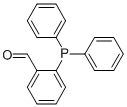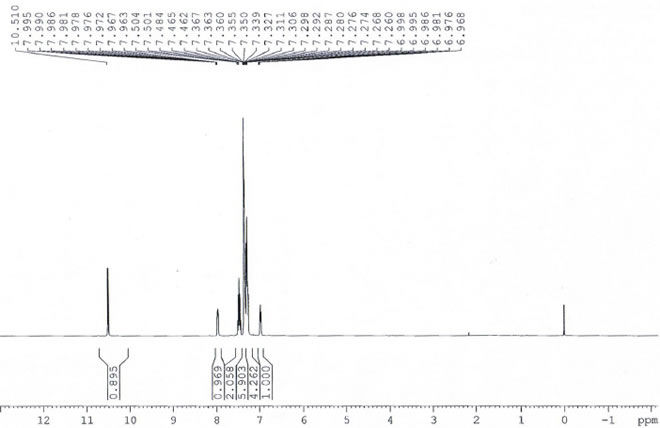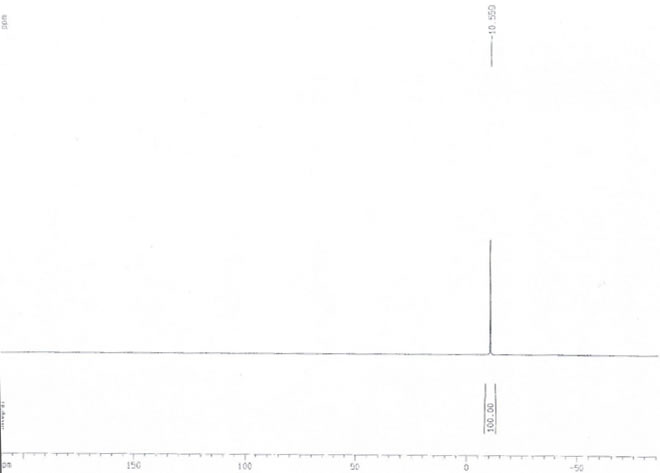2-Diphenylphosphinobenzaldehyde CAS#: 50777-76-9; ChemWhat Code: 38768
Identification
| Product Name | 2-Diphenylphosphinobenzaldehyde |
| IUPAC Name | 2-diphenylphosphanylbenzaldehyde |
| Molecular Structure |  |
| CAS Registry Number | 50777-76-9 |
| MDL Number | MFCD00013367 |
| Synonyms | (2-formylphenyl)(diphenyl)phosphine, 2-(diphenylphosphino)benzaldehyde, 2-diphenylphosphinobenzaldehyde |
| Molecular Formula | C19H15OP |
| Molecular Weight | 290.301 |
| InChI | InChI=1S/C19H15OP/c20-15-16-9-7-8-14-19(16)21(17-10-3-1-4-11-17)18-12-5-2-6-13-18/h1-15H |
| InChI Key | DRCPJRZHAJMWOU-UHFFFAOYSA-N |
| Canonical SMILES | C1=CC=C(C=C1)P(C2=CC=CC=C2)C3=CC=CC=C3C=O |
Physical Data
| Appearance | Light yellow powder |
| Flash Point | 206.263 °C |
| Boiling Point | 417.444 °C at 760 mmHg |
| Melting Point, °C | Solvent (Melting Point) |
| 113 – 115 | ethyl acetate, hexane |
Spectra
| Description (NMR Spectroscopy) | Nucleus (NMR Spectroscopy) | Solvents (NMR Spectroscopy) | Frequency (NMR Spectroscopy), MHz |
| Chemical shifts | 1H | chloroform-d1 | 400 |
| Chemical shifts | 13C | chloroform-d1 | 100 |
| Chemical shifts | 31P | chloroform-d1 | 122 |
| 2-Diphenylphosphinobenzaldehyde CAS#: 50777-76-9 HNMR |  |
| 2-Diphenylphosphinobenzaldehyde CAS#: 50777-76-9 PNMR |  |
| Description (IR Spectroscopy) | Solvent (IR Spectroscopy) | Comment (IR Spectroscopy) |
| Bands | KBr | 1701 – 1679 cm**(-1) |
| Bands | KBr | 2870 – 1700 cm**(-1) |
| Solvent (UV/VIS Spectroscopy) | Absorption Maxima (UV/VIS), nm | Ext./Abs. Coefficient, l·mol-1cm-1 |
| CH2Cl2 | 242, 314, 376 | 10415, 1784, 672 |
Route of Synthesis (ROS)

| Conditions | Yield |
| With triethylamine; tetrakis(triphenylphosphine) palladium(0) In toluene for 2h; Heating; | 85% |
| With tetrakis(triphenylphosphine) palladium(0); triethylamine In toluene at 110℃; for 2.5h; Inert atmosphere; Reflux; | 62% |
| With sodium acetate; palladium diacetate In N,N-dimethyl-formamide for 24h; Inert atmosphere; Reflux; |
Safety and Hazards
| Pictogram(s) |  |
| Signal | Warning |
| GHS Hazard Statements | H315: Causes skin irritation [Warning Skin corrosion/irritation] H319: Causes serious eye irritation [Warning Serious eye damage/eye irritation] H335: May cause respiratory irritation [Warning Specific target organ toxicity, single exposure; Respiratory tract irritation] |
| Precautionary Statement Codes | P261, P264, P271, P280, P302+P352, P304+P340, P305+P351+P338, P312, P321, P332+P313, P337+P313, P362, P403+P233, P405, and P501 (The corresponding statement to each P-code can be found at the GHS Classification page.) For more detailed information, please visit ECHA C&L website |
Other Data
| Transportation | Not dangerous goods |
| Under the room temperature and away from light | |
| HS Code | 294200 |
| Storage | Under the room temperature and away from light |
| Shelf Life | 2 years |
| Market Price | USD 2300/kg |
| Use Pattern |
| 2-Diphenylphosphinobenzaldehyde is a useful catalyst in many reactions. |
Buy Reagent | |
| No reagent supplier? | Send quick inquiry to ChemWhat |
| Want to be listed here as a reagent supplier? (Paid service) | Click here to contact ChemWhat |
Approved Manufacturers | |
| Warshel Chemical Ltd | https://www.warshel.com/ |
| Want to be listed as an approved manufacturer (Requires approvement)? | Please download and fill out this form and send back to approved-manufacturers@chemwhat.com |
Contact Us for Other Help | |
| Contact us for other information or services | Click here to contact ChemWhat |
